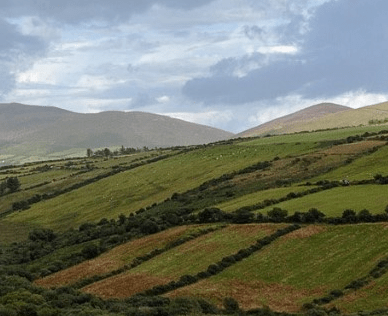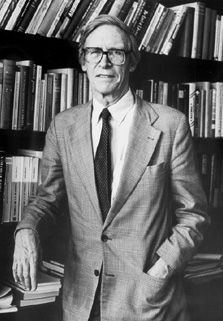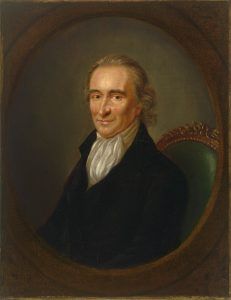 Private Property, Economic Freedom, and the Socialization of Rent
Private Property, Economic Freedom, and the Socialization of Rent
By Gavin Kerr
The idea of land value taxation (LVT) featured more prominently in the UK General Election of 2017 than perhaps in any UK election since the General Election of 1911, when Lloyd George’s Liberal Party won a mandate to implement the package of land-taxes incorporated in the ‘People’s Budget’ of 1909. The 2017 election was certainly the first for many years in which LVT was openly acknowledged by one of the two political parties which had any chance of winning a majority of seats in the House of Commons. The proposal of the Labour Party to consider the idea of replacing the Council Tax and Business Rates with LVT was the result of a number of factors, including the growing number of economists who recognize the strength of the economic case for LVT, and the increasingly obvious need for the reform of the UK housing market.
While the growing prominence of LVT in UK politics is of course to be welcomed, the way in which it has been endorsed by many of its proponents is a matter of some concern. Rather than making the case, from considerations of justice and freedom as well as those of economic efficiency, for a shift in the burden of taxation from productive economic activity to the rental value of land, many of the proponents of LVT on the left of British politics have instead argued for the implementation of LVT solely as a replacement for existing property taxes, such as the Council Tax, National Non-Domestic Rates, and Stamp Duty Land Tax. Such a reform would be implemented in order to achieve a relatively narrow set of aims centred predominantly around dealing with the shortage of affordable housing in Britain, a problem which has been growing more and more serious since the implementation of the so-called ‘property-owning democracy’ policies of the Conservative government of the 1980s. The wider set of social problems facing the citizens of Britain, including poverty, unemployment, economic insecurity, welfare dependency, and rising living costs, would then be solved through the implementation of a range of interventionist policies which would enhance the control exercised by the state over the economic sphere, with the overall burden of taxation imposed on productive economic activity becoming heavier rather than lighter.
Those familiar with the work of Henry George will be likely to take the view that LVT is much more than just a narrow housing policy reform which is tacked on to a manifesto that proposes to solve the major social problems primarily by enhancing the power of the state and raising the overall level of taxation. George proposed the taxation of land rent as a ‘single tax’ which would replace the taxes and tariffs that existed in late nineteenth century America, solving the problem of poverty by eliminating the inefficiencies and distortions generated by existing taxation, and by making land freely accessible to all. Even if one is reluctant to accept that the taxation of productive economic activity can be entirely eliminated, one should still recognize that the most serious social problems are rooted ultimately in the privatization of land rent and can be solved only by shifting the burden of taxation away from productive economic activity and on to the rental value of land.
I believe that the failure of many of the proponents of LVT to understand the full significance of the socialization of land rent stems in large part from the implicit acceptance by many on the left of British politics of one of the central aspects of the neo-liberal ideology that has become increasingly influential since the late 1970s – namely, the idea that the protection of economic freedom is compatible with, and in fact depends upon, the institution of full private property in land and natural resources. Those who adopt this neo-liberal interpretation of what it means to protect economic freedom see the private ownership of land as an essential feature of free market capitalism, in no way distinguishable from the private ownership of any other form of property. The left-wing opponents of so-called ‘free market capitalism’ have rejected the ideology of neo-liberalism not by challenging the neo-liberal interpretation of economic freedom, but rather by downplaying the importance of the institution of private property, and elevating equality above economic freedom. The idea that full private property in land is an essential feature of free market capitalism has not seriously been contested.
In this article I would like to explore some of the ways in which the uncontested acceptance of the neo-liberal conceptions of economic freedom and free market capitalism in the political sphere is paralleled by a similar situation in the academic context of mainstream liberal political theory. I would also like to highlight what seems to me to be one of the key mistakes made by those liberal political thinkers who have challenged the neo-liberal conceptions of economic freedom and free market capitalism. I shall prepare the ground for the discussion by focusing briefly on recent expressions of the tradition of classical liberalism, which provides much of the theoretical background against which the ideology of neo-liberalism has arisen.
The most influential classical liberal thinker of the twentieth century was probably Friedrich Hayek, who competed with John Maynard Keynes for political influence in the post-war years, finally managing to have an impact on the shaping of economic policy towards the end of the 1970s with the rise of Margaret Thatcher and Ronald Raegan in Britain and America. Hayek’s work emphasized the connection between the limits of human knowledge and the fundamentally important role played by the institution of private property in facilitating the mutually beneficial coordination of the diverse practical plans and purposes pursued by the citizens of a large and complex society. Hayek argued that since the practical knowledge on which rational economic activity depends is dispersed throughout society, embodied in the skills and habits of countless individuals, it follows that the only way in which rational economic activity can occur is through the operation of the market process, in particular through the knowledge-gathering role of market pricing which allows dispersed knowledge to be utilized to everyone’s advantage.
For Hayek, the possibility of rational and mutually beneficial economic activity depended on the existence of a free market within which prices could be set by producers and consumers changing their patterns of production and consumption in line with changes in the prices of goods and commodities. And such a market could exist, in his view, only within a stable and predictable legal framework of rules and institutions, including those of private property and freedom of contract. Such a legal framework would minimize ‘the mutual interference of people’s actions with each other’s intentions’, and ‘prevent as much as possible, by drawing boundaries, the actions of different individuals from interfering with each other’.
Partly for these reasons, Hayek saw the private property-based market system as a kind of ‘contest’ which is ‘played according to rules and decided by superior skill, strength, or good fortune’ – a particularly efficient ‘wealth-creating game’ which greatly increases the production of material resources, thereby enhancing the prospects of all participants in the game to satisfy their needs. Since Hayek believed that interfering in this ‘game’ in order to maximize particular results for particular individuals or groups could reasonably be expected to be counterproductive, he opposed the imposition of redistributive progressive taxation and regulatory mechanisms designed to improve the positions of the poorest members of society. His key message, ultimately realized (at least partially) in the policies implemented by the Conservative government of the 1980s, was that the combination of proportional or ‘flat’ income taxation, the deregulation of private economic activity, and the provision of a ‘safety-net’ minimum income, would improve the life-prospects of all citizens, including the least well-off, by strengthening the protection of individual economic liberty.
More recently, Hayek’s ideas have been absorbed and redeveloped by proponents of the currently emerging school of ‘neo-classical’ liberalism (not to be confused with the tradition of neo-classical economics), which seeks to provide a more coherent and robust theoretical grounding for the laissez-faire free market-based institutions endorsed by Hayek. Contemporary neo-classical liberals have argued, in strongly Hayekian vein, that the most effective way to ensure that all citizens, including the least well-off, have the best opportunity to pursue their individual aims and purposes is to implement policies that generate an economic environment which is conducive to wealth-creation and material prosperity. And the policies that generate such an environment, so they argue, are those that generate laissez-faire institutions that secure economic liberty by strongly protecting the institution of private property – including private property in land.
The school of neo-classical liberalism is therefore a clear reflection in the academic sphere of the ideology of neo-liberalism that is so prevalent in the political sphere – at least with regard to economic policy in the context of domestic politics. The core idea seems to be that the low-tax, light-regulation institutional framework which secures economic liberty by protecting the right to private property is also the institutional framework that most effectively maximizes wealth-creation and thereby enhances the substantive opportunities and capabilities of citizens to pursue their aims and purposes. Proponents of this view, whether political or academic, typically oppose the implementation of supposedly ‘progressive’ interventionist mechanisms – such as high rates of progressive redistributive taxation, minimum wage legislation, the regulation of contracts of employment, and so on – on the basis that such interference in the ‘free market’ constitutes a violation of economic liberty which will result in poverty rather than prosperity for all.
One thing which is clearly entirely absent from this ideological position is any awareness of the significance of the law of rent and of land as a distinct factor of production. The law of rent, formulated by David Ricardo in the early nineteenth century, and incorporated fully into the science of political economy by Henry George in the late nineteenth century, states that the rental value of a particular site is equal to the potential excess of output which may be obtained from this site over and above the potential output which may be obtained, from the same application of labour and capital, on a site of equal area which is the least productive in use. One important implication of this law of economic reality is that the productive potential of a given site is reflected in the rental value of this site – those in the most valuable locations have the highest productive potential, while those in the least valuable locations have the lowest productive potential. It follows from this that firms utilizing sites in different locations are not necessarily able to bear the same burdens of taxation, even if they are managed to the same level of efficiency: those utilizing sites in more valuable locations are able to bear a higher burden of taxation than those utilizing sites in less valuable locations; while those utilizing sites in the least valuable locations may not be able to bear any tax burden at all.
One obvious problem for the neo-liberal position sketched above is that if the core functions of the state are funded through the imposition of flat or proportional taxation on incomes, wages, or consumption, then many of the firms utilizing sites in less valuable locations which would have been viable in the absence of such taxation will be not in fact be viable. This is partly because unlike profitable firms based in more valuable locations, efficiently run firms based in less valuable locations making just enough to cover the costs of production have no reserves from which to pay an additional tax burden. Another problem is that firms which do remain viable even after the imposition of such taxation will employ fewer workers and create less wealth, since the taxation of productive economic activity – in the form of income, payroll, and value-added tax – artificially increases the pre-tax wages that employers are required to pay, and artificially reduces the demand for the goods and services that each firm produces.
The inevitable result of the flat-tax system endorsed by the neo-liberals, then, is to generate an economic environment which is not conducive to productive economic activity, thereby impeding and suppressing wealth-creation and prosperity. And what this means is that the role of the state must inevitably expand far beyond the core functions envisaged by the neo-liberals, to incorporate the provision of the extensive set of welfare services and benefits necessitated by the poverty and unemployment resulting from the taxation of productive economic activity. This then means that it is not possible to create a low-tax economic environment which is conducive to productive economic activity – what the neo-liberals refer to as a ‘low-tax’ economy is in fact a high-tax economy which makes prosperity for all impossible to achieve.
An important implication of the above analysis is that those impoverished by the imposition of taxation on productive economic activity are in no way personally responsible for their plight: it is not because people are naturally less talented or able that they find themselves dependent on welfare and barely able to make ends meet; and it is often not the most economically productive who end up among the most well-off in society. It is rather that the most well-off are able to systematically exploit the least well-off by privately appropriating the natural source of public revenue – the rent of land. The possibility of this systematic parasitical exploitation arises from another fact of economic reality connected to the law of rent – namely, that the value of land does not derive from the efforts or productive contributions made by the owners of valuable sites, nor indeed from the efforts of any individuals qua individuals. The rent of land derives rather from the efforts, productive contributions, and simple existence of the wider community of which each landowner is but one small fraction, as well as from the public goods and services the provision of which constitutes the core functions of the state.
This being the case, it follows that if these core functions of the state are funded through the imposition of taxation on productive economic activity rather than through the socialization of land rent, then the private owners of valuable sites will find themselves in a position to appropriate value that they have not created, while those who do not own valuable sites will be compelled to hand over a substantial proportion of value that they have created – the wages and interest earned from contributions of labour and capital – to the public authority which is responsible for the protection of legal rights, including the right to private property. In this way, the privatization of land rent results in the violation of the natural rights of producers to the fruits of their labour, as well as the violation of citizens’ natural rights freely to utilize the opportunities provided by nature for the pursuit of their individual aims and purposes.
Thus, the legal protection of the right to full, unconditional private property in land is incompatible with the effective protection of the right to private property in the broader sense in which this right has been identified by classical liberal thinkers as the foundation of economic liberty and prosperity for all. As George put it, when ‘non-producers can claim as rent a portion of the wealth created by producers, the right of the producers to the fruits of their labour is to that extent denied’. For this reason, to affirm that people can rightfully claim exclusive ownership in their own labour as embodied in material things, ‘is to deny that any one can rightfully claim exclusive ownership in land’.
What this means, of course, is that the reason that a substantial proportion of the citizens of economically advanced liberal democratic societies are deprived, impoverished, and in need of assistance is not that economic liberty in these societies is too strongly protected, but rather that economic liberty is systematically violated by the privatization of land rent. A shift in the burden of taxation from productive economic activity to the rental value of land would generate a genuine free-market society in which citizens’ rights to create, acquire, and utilize private property in the pursuit of their aims and purposes could be effectively protected. Thus, the socialization of land rent is an essential precondition both for the effective protection of economic freedom, and for the creation of an economic environment which is conducive to wealth-creation and prosperity for all.

Unfortunately, it is not only proponents of neo-liberal policies and institutions, but also the left-leaning opponents of the neo-liberal ideology who lack awareness of the law of rent and its significance. Since the early 1970s the dominant force within the mainstream liberal academic community has been the left-leaning form of liberalism – which I shall refer to as ‘social liberalism’ – which began to emerge in the mid-nineteenth century in response to the social problems which seemed to have arisen under the laissez-faire institutions endorsed by the classical liberals of the eighteenth and early nineteenth centuries. The American political philosopher John Rawls was by far the most influential thinker in the modern social liberal tradition, and contemporary social liberal thinking still takes place very much in his shadow. Rawls proposed two principles of justice, the first relating to civil and political rights and liberties, and the second relating to the economic sphere. An important aspect of his second principle was the idea that economic inequalities are justifiable only if they are necessary to improve the life prospects of the least well-off members of society, and should be eliminated if they are not justifiable in this way.
Rawls attempted to justify his second principle of justice by arguing that differences in people’s natural talents and abilities are entirely morally arbitrary: those blessed with superior natural talents and abilities cannot be said to ‘deserve’ the economic advantages they obtain by exercising these talents and abilities; while those who happen to be naturally less talented cannot be said to ‘deserve’ the disadvantages that result from their lack of fortune in the ‘natural lottery’. Rawls argued on this basis firstly, that economic inequality must be justifiable to the least well-off members of society, and secondly, that the only way in which inequality could be justified to the least well-off was by being shown to improve their overall positions and life-prospects (for example, by providing incentives that encourage the development of skills and the performance of difficult or dangerous work). For Rawls and his followers, then, economic liberty and the right to private property, together with the inequalities that they generate, are valuable only to the extent that they improve the life-prospects of the least advantaged members of society, and must be restricted to the extent that they do not achieve this fundamental demand of social justice.
Since the contemporary followers of Rawls lack any awareness of the law of rent, they have tended to object to the classical liberal narrative not by challenging the conception of economic liberty that constitutes one of the key features of that narrative, but rather by rejecting the causal connection drawn by the classical liberals between individual economic liberty and prosperity for all. The social liberal narrative is that it is the excessive protection of individual economic liberty resulting from the implementation of pro-‘free market’ neo-liberal policies since the late 1970s that has generated poverty, deprivation, and unjustifiable economic inequality. Considered from this perspective, the central problem of our time is that ‘free market capitalism’ allows the most naturally talented and productive members of society to benefit from their good fortune in ways that do not benefit the less advantaged, who are not talented or highly skilled or educated enough to earn themselves a decent living. And the way to solve this problem is to intervene in the ‘free market’ by imposing progressive redistributive taxation, increasing the minimum wage, strengthening employment protection legislation, and so on.
This social liberal narrative is very clearly reflected in the political sphere by the left-wing ideology currently articulated by the leadership of the British Labour Party. What we need, we are told, is a more ‘caring and compassionate’ society in which the weak and vulnerable are taken care of, and in which the wealthier members of society must ‘shoulder their fair share of the burden’. In reality, as laid bare by an understanding of the law of rent, people are ‘weak and vulnerable’ precisely because their economic liberty is systematically violated by the privatization of land rent. What we need is an economically just society in which people are not made weak and vulnerable by the systematic violation of their rights to the fruits of their labour, and of their rights to utilize the natural opportunities provided by nature.

But there is another aspect of the social liberal misunderstanding and misdiagnosis of the problem of poverty amid plenty which has roots that go back at least as far as the work of the radical liberal thinker and activist Thomas Paine. Paine was one of the first political thinkers to theorize mass poverty as a systematic injustice – neither inevitable nor deserved – caused by an inequitable system of private property in land. In his pamphlet Agrarian Justice, Paine argued that given the ‘incontrovertible truth’ that the earth in its ‘natural’ state was ‘the common property of the human race’, it followed that ‘[e]very proprietor….of cultivated lands, owes to the community a ground-rent…for the land which he holds’. Paine proposed that a ‘national fund’ be raised from this ground rent from which the state would provide an old age pension for all citizens over the age of 50, and a one-off capital allowance to provide young people with the means ‘to begin the world’.
However, although Paine said that it was from ground-rents that his proposed fund was to be generated, a closer look at Agrarian Justice shows that what he was in fact endorsing was a kind of estate or inheritance tax, which was a tax on the value of wealth – property created by human labour – rather than on the unimproved value of land. Paine attempted to justify this aspect of his proposal by arguing that all wealth (what he called ‘artificial’ property), is ‘the effect of society’ – ‘as impossible for an individual to acquire… without the aid of society, as it is for him to make land originally’. Since all accumulation of wealth ‘beyond what a man’s own hands produce, is derived to him by living in society’, it follows, Paine argued, that each person ‘owes on every principle of justice, of gratitude, and of civilization, a part of that accumulation back again to society from whence the whole came’.
Regrettably, it was Paine’s idea of wealth as ‘the effect of society’, rather than his initial focus on the idea of a ‘ground-rent’ owed by ‘proprietors of cultivated lands’, that was to form one of the cornerstones of the social liberal tradition. Early in the twentieth century L. T. Hobhouse, perhaps the most notable of the ‘New Liberal’ thinkers influenced by the social liberalism of John Stuart Mill, followed Paine in combining support for some form of land-rent taxation with a much broader conception of socially created property than any suggested by the law of rent. On Hobhouse’s account, the social origin of property derives from the status of machinery, technology, and knowledge as gifts ‘of acquired civilization’ – methods and conditions of production which ‘have been built up by the collective effort of generations of men of science and organizers of industry’, and which derive from ‘the general progress of the world’. Hobhouse thought that the social origin of property justified the imposition of high rates of progressive income and inheritance taxation which would be unlikely to diminish the supply of capital or to discourage the provision of any service of genuine social value.
More recently, proponents of the so-called ‘knowledge inheritance theory of distributive justice’ have argued on the basis of a similar conception of socially created property that a large proportion of the wealth which exists in liberal democratic societies – perhaps as much as 80% – is in fact socially created, and should as a matter of basic justice be reallocated equally to all members of society. One implication of this conception of socially created wealth (now widely accepted by contemporary social liberal thinkers) is that since privately created property constitutes only a small proportion of total wealth, strongly protected individual economic liberty is compatible with the imposition of very high rates of taxation and state expenditure – perhaps as high as 70-80% of Gross Domestic Product (GDP): if only 20-30% of total wealth is attributable to individual productive contributions, then citizens can be economically free even if two-thirds or more of GDP is socialized.
A clear understanding of the law of rent and its implications tells us that this increasingly influential conception of ‘socially created’ wealth is far too broad, providing unsound and illegitimate grounds for the implementation of interventionist policies which would restrict economic liberty and suppress productive economic activity even further than is currently the case in contemporary liberal societies. In the light of his understanding of the law of rent, Henry George saw that what Paine referred to as ‘the effect of society’ in making possible the creation and accumulation of personal property was itself reflected in the rental value of land. Sites located in close proximity to large numbers of people with the knowledge, skills, and training needed to operate the most productive machinery and technology were more potentially productive, and therefore more valuable, than sites located further from such agglomeration centres. Thus, as George put it, the rental value of land ‘expresses in exact and tangible form the right of the community in land held by an individual’, and therefore ‘the exact amount which the individual should pay to the community to satisfy the equal rights of all other members of the community’.
Deprived of the illumination provided by a clear understanding of the law of rent, the social liberal critics of classical liberal thought have mistakenly concluded that one of the main reasons for the problems facing the citizens of contemporary liberal societies is that not enough wealth has been socialized. The real problem, of course, is that the privatization of what should be socialized – the rent of land – has resulted in the socialization of too much of what is privately created. Only a shift in the burden of taxation from productive economic activity to the rent of land will create the flourishing free market economy that is essential both to the effective protection of citizens’ rights to the fruits of their labour, and to the achievement of prosperity for all.




